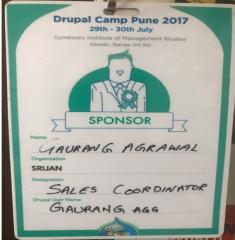Submitted by GAURANGAGG on Tue, 05/23/2017 - 07:22
He added several more points for context on what he means by accepting generosity, seeking generosity, and being generous:
When you run into a difficult time in your career, such as being laid off or fired, your resume won't help you quickly find a new job but your friends and associates will.
Don't "keep score" of how many favors you make versus how many you take. There will inevitably be people you help who prove to be selfish, but they shouldn't compel you to change your approach. "If your interactions are ruled by generosity, your rewards will follow suit," Ferrazzi wrote.
Don't do favors only for those who outrank you, and don't look down on those you outrank. "The business world is a fluid, competitive landscape," and you never know where you or the people you interact with will end up down the line.
Contribute your "time, money, and expertise" to those in your network.
"Relationships are solidified by trust," he wrote. "In other words, the currency of real networking is not greed but generosity."
Focusing on earning money early on - earn money when you startup - there is no glory in having a startup for the sake of it
- Finishing a product and earning money from it - improtant
- Not many are genius and that's okay.
- It’s enough to be smart and willing to work hard, which is all it takes to be successful in entrepreneurship. Ok, throw in a bit of luck, too, but keep in mind luck favors the persistent.
Anyone can create a job for themselves. But not everyone can change the world — Dan Norris
building a healthy business is to build a small business, focused on growth and most important on delivering value to your customers. The focus from day one should be on getting clients to pay for your product.
A solid and healthy venture, should get the money it needs from its customers, not from VCs.
The reality is you can easily start a business while working a 9–5 job, which will dramatically reduce the amount of money you need. Then when you have 6 to 12 months of cash in the bank, you’re ready to quit your job and focus solely on your business.
Small is not just a stepping-stone. Small is a great destination itself — Jason Fried, Basecamp
They did everything right:
- Launched a product while being a full-time consultancy shop
- Once they had enough traction they focused on Basecamp full-time
- They didn’t sell-off to VCs
- And most important: they made money in the process
Now, I admit Basecamp is a pretty solid product which for most people would be considered a huge success. However, you could be just as successful even if you didn’t make it as big as Basecamp.
But what would you prefer: making some money and be a success or burning through others’ money and fail?
Everyone is an entrepreneur. The only skills you need to be an entrepreneur are the ability to fail, to have ideas, to sell those ideas, to execute on them, and to be persistent so even as you fail you learn and move onto the next adventure.
— James Altucher
Instead, you should look for others’ pains and needs and build a product out of those.
Go on Quora, Reddit or any other online location where your peers like to hang out and discuss.
The fun stuff people love to do but actually doesn't do shit for you:
- Logos
- Names
- Cards
- Stickers
- Designs
- OCD-like organization
- BPMN Documentation
The not so fun stuff that people hate but actually does stuff for you:
- Selling your product
- Cold-calling
- Cold-emailing
- Sales strategies / pricing
- Quickbooks / taxes
Focus on where the meat is, what gets you the most results in the least possible time.
If you’re building a productized service, you might even want to do everything yourself manually, while presenting it in a way that makes it look automatic: it’s not cheating, since your customers would be getting the same result anyway. But always deliver — or over-deliver — on what you promise!
Remember, the focus of a business should be on delivering value and making money while doing so, unlike a usual startup, whose sole purpose often seems to be burning money and thinking of ways to eventually turn a profit in the future.
Once you build the first version, your focus should be on promoting your product and the best way to do it is to start a blog and talk to your audience, helping them by writing great content that speaks directly to them and gets them to realize how much value you can provide them.
Be honest and helpful, always, and try to give away more than you get back.
After a while, you’ll know if your product can make it or not, but you won’t know it until you actually sit down, build it and launch it.
Compared to the rest of the companies I work with here, you actually have a real business model."
Immediate revenue
I found it much more a burden, though I suppose one could always get lucky and find a job where you barely have to work at all.
If you don't commit 100%, you're splitting yourself. Most jobs require the 9-5, which is essentially saying "you value working for them more than working for yourself".
You're giving them your best hours, and that's the reality. You're saying "I don't trust myself enough to invest everything in me". If that's a reality you can deal with and still manage to succeed, more power to you. I could not, and wish that I had.
Whereas adults, by definition, are not allowed to flake. They still do, of course, but when they do they're ruthlessly pruned.
The adult response to "that's a stupid idea," is simply to look the other person in the eye and say "Really? Why do you think so?"
So now I'd advise people to go ahead and start startups right out of college. There's no better time to take risks than when you're young. Sure, you'll probably fail. But even failure will get you to the ultimate goal faster than getting a job.
In a job you even after years you will be diffident(shy) programmers.
It worries me a bit to be saying this, because in effect we're advising people to educate themselves by failing at our expense, but it's the truth.
3. Not determined enough
You need a lot of determination to succeed as a startup founder. It's probably the single best predictor of success.
Some people may not be determined enough to make it. It's hard for me to say for sure, because I'm so determined that I can't imagine what's going on in the heads of people who aren't. But I know they exist.
Most hackers probably underestimate their determination. I've seen a lot become visibly more determined as they get used to running a startup. I can think of several we've funded who would have been delighted at first to be bought for $2 million, but are now set on world domination.
How can you tell if you're determined enough, when Larry and Sergey themselves were unsure at first about starting a company? I'm guessing here, but I'd say the test is whether you're sufficiently driven to work on your own projects. Though they may have been unsure whether they wanted to start a company, it doesn't seem as if Larry and Sergey were meek little research assistants, obediently doing their advisors' bidding. They started projects of their own.
You may need to be moderately smart to succeed as a startup founder.
. But most companies do more mundane stuff where the decisive factor is effort.
But if you think it takes a lot of intelligence to get rich, try spending a couple days in some of the fancier bits of New York or LA.
If you don't think you're smart enough to start a startup doing something technically difficult, just write enterprise software. Enterprise software companies aren't technology companies, they're sales companies, and sales depends mostly on effort.
You don't need to know anything about business to start a startup. The initial focus should be the product. All you need to know in this phase is how to build things people want. If you succeed, you'll have to think about how to make money from it. But this is so easy you can pick it up on the fly.
And acquirers tell me privately that revenue is not what they buy startups for, but their strategic value. if users love you, you can always make money from that somehow, and if they don't, the cleverest business model in the world won't save you.So when you find an idea you know is good but most people disagree with, you should not merely ignore their objections, but push aggressively in that direction. In this case, that means you should seek out ideas that would be popular but seem hard to make money from.
We've funded two single founders, but in both cases we suggested their first priority should be to find a cofounder. Both did. But we'd have preferred them to have cofounders before they applied. It's not super hard to get a cofounder for a project that's just been funded, and we'd rather have cofounders committed enough to sign up for something super hard.
If there's no one where you live who wants to start a startup with you, move where there are people who do. If no one wants to work with you on your current idea, switch to an idea people want to work on.
If you're still in school, you're surrounded by potential cofounders. A few years out it gets harder to find them. Not only do you have a smaller pool to draw from, but most already have jobs, and perhaps even families to support. So if you had friends in college you used to scheme about startups with, stay in touch with them as well as you can. That may help keep the dream alive.
It's possible you could meet a cofounder through something like a user's group or a conference. But I wouldn't be too optimistic. You need to work with someone to know whether you want them as a cofounder. [2]
The real lesson to draw from this is not how to find a cofounder, but that you should start startups when you're young and there are lots of them around.
. We're confident we can sit down with you and cook up some promising project.
We put little weight on the idea. We ask mainly out of politeness. The kind of question on the application form that we really care about is the one where we ask what cool things you've made.
If what you've made is version one of a promising startup, so much the better, but the main thing we care about is whether you're good at making things. Being lead developer of a popular open source project counts almost as much.
. Find something that's missing in your own life, and supply that need—no matter how specific to you it seems. Steve Wozniak built himself a computer; who knew so many other people would want them?
A need that's narrow but genuine is a better starting point than one that's broad but hypothetical. So even if the problem is simply that you don't have a date on Saturday night, if you can think of a way to fix that by writing software, you're onto something, because a lot of other people have the same problem
No room for more startups
A lot of people look at the ever-increasing number of startups and think "this can't continue." Implicit in their thinking is a fallacy: that there is some limit on the number of startups there could be. But this is false. No one claims there's any limit on the number of people who can work for salary at 1000-person companies. Why should there be any limit on the number who can work for equity at 5-person companies? [3]
Nearly everyone who works is satisfying some kind of need. Breaking up companies into smaller units doesn't make those needs go away.
Because satisfying current needs would lead to more.
So there is no limit to the amount of work available for companies, and for startups in particular.
I'm willing to take responsibility for telling 22 year olds to start startups. So what if they fail? They'll learn a lot, and that job at Microsoft will still be waiting for them if they need it. But I'm not prepared to cross moms.
What you can do, if you have a family and want to start a startup, is start a consulting business you can then gradually turn into a product business. Empirically the chances of pulling that off seem very small. You're never going to produce Google this way. But at least you'll never be without an income.
As with the question of cofounders, the real lesson here is to start startups when you're young.
Finding unique values.
At the atomic level, all businesses need to generate revenue to pay their bills, grow their business, and stay in business. The sooner they find themselves in the black, the better chance they’ll have to survive. Call it a business survival instinct — businesses have to feed themselves or they’ll die.
They’re far less prepared when they eventually have to leave the house for the first time.
Earn money - charge.
I've come close to starting new startups a couple times, but I always pull back because I don't want four years of my life to be consumed by random schleps. I know this business well enough to know you can't do it half-heartedly. What makes a good startup founder so dangerous is his willingness to endure infinite schleps.
I like to work. And one of the many weird little problems you discover when you get rich is that a lot of the interesting people you'd like to work with are not rich. They need to work at something that pays the bills. Which means if you want to have them as colleagues, you have to work at something that pays the bills too, even though you don't need to. I think this is what drives a lot of serial entrepreneurs, actually.
That's why I love working on Y Combinator so much. It's an excuse to work on something interesting with people I like.
s. And that's fine. If you want to spend your time travelling around, or playing in a band, or whatever, that's a perfectly legitimate reason not to start a company.
If you start a startup that succeeds, it's going to consume at least three or four years. (If it fails, you'll be done a lot quicker.) So you shouldn't do it if you're not ready for commitments on that scale.
Be aware, though, that if you get a regular job, you'll probably end up working there for as long as a startup would take, and you'll find you have much less spare time than you might expect. So if you're ready to clip on that ID badge and go to that orientation session, you may also be ready to start that startup.
. There may be one person whose job title is CEO, but till the company has about twelve people no one should be telling anyone what to do. That's too inefficient. Each person should just do what they need to without anyone telling them.
If that sounds like a recipe for chaos, think about a soccer team. Eleven people manage to work together in quite complicated ways, and yet only in occasional emergencies does anyone tell anyone else what to do. A reporter once asked David Beckham if there were any language problems at Real Madrid, since the players were from about eight different countries. He said it was never an issue, because everyone was so good they never had to talk. They all just did the right thing.
How do you tell if you're independent-minded enough to start a startup? If you'd bristle at the suggestion that you aren't, then you probably are.
Fear of uncertainty.
If you start a startup, anything might happen.
Well, if you're troubled by uncertainty, I can solve that problem for you: if you start a startup, it will probably fail. Seriously, though, this is not a bad way to think about the whole experience. Hope for the best, but expect the worst. In the worst case, it will at least be interesting. In the best case you might get rich.
No one will blame you if the startup tanks, so long as you made a serious effort. There may once have been a time when employers would regard that as a mark against you, but they wouldn't now. I asked managers at big companies, and they all said they'd prefer to hire someone who'd tried to start a startup and failed over someone who'd spent the same time working at a big company.
Nor will investors hold it against you, as long as you didn't fail out of laziness or incurable stupidity. I'm told there's a lot of stigma attached to failing in other places—in Europe, for example. Not here. In America, companies, like practically everything else, are disposable.
They do it in the hope of recruiting them when they graduate. So while they're happy if you produce, they don't expect you to.
That will change if you get a real job after you graduate. Then you'll have to earn your keep. And since most of what big companies do is boring, you're going to have to work on boring stuff. Easy, compared to college, but boring. At first it may seem cool to get paid for doing easy stuff, after paying to do hard stuff in college. But that wears off after a few months. Eventually it gets demoralizing to work on dumb stuff, even if it's easy and you get paid a lot.
And that's not the worst of it. The thing that really sucks about having a regular job is the expectation that you're supposed to be there at certain times. Even Google is afflicted with this, apparently. And what this means, as everyone who's had a regular job can tell you, is that there are going to be times when you have absolutely no desire to work on anything, and you're going to have to go to work anyway and sit in front of your screen and pretend to. To someone who likes work, as most good hackers do, this is torture.
In a startup, you skip all that. There's no concept of office hours in most startups. Work and life just get mixed together. But the good thing about that is that no one minds if you have a life at work. In a startup you can do whatever you want most of the time. If you're a founder, what you want to do most of the time is work. But you never have to pretend to.
If you took a nap in your office in a big company, it would seem unprofessional. But if you're starting a startup and you fall asleep in the middle of the day, your cofounders will just assume you were tired.
But I will give you a couple reasons why a safe career might not be what your parents really want for you.
In almost everything, reward is proportionate to risk. So by protecting their kids from risk, parents are, without realizing it, also protecting them from rewards. If they saw that, they'd want you to take more risks.
o I think the way to deal with your parents' opinions about what you should do is to treat them like feature requests. Even if your only goal is to please them, the way to do that is not simply to give them what they ask for. Instead think about why they're asking for something, and see if there's a better way to give them what they need.
Frightening as it seemed to them, it's now the default with us to live by our wits. So if it seems risky to you to start a startup, think how risky it once seemed to your ancestors to live as we do now. Oddly enough, the people who know this best are the very ones trying to get you to stick to the old model. How can Larry and Sergey say you should come work as their employee, when they didn't get jobs themselves?
I wouldn't be surprised if one day people look back on what we consider a normal job in the same way. How grim it would be to commute every day to a cubicle in some soulless office complex, and be told what to do by someone you had to acknowledge as a boss—someone who could call you into their office and say "take a seat," and you'd sit! Imagine having to ask permission to release software to users. Imagine being sad on Sunday afternoons because the weekend was almost over, and tomorrow you'd have to get up and go to work. How did they stand it?
It's exciting to think we may be on the cusp of another shift like the one from farming to manufacturing. That's why I care about startups. Startups aren't interesting just because they're a way to make a lot of money. I couldn't care less about other ways to do that, like speculating in securities. At most those are interesting the way puzzles are. There's more going on with startups. They may represent one of those rare, historic shifts in the way wealth is created.
That's ultimately what drives us to work on Y Combinator. We want to make money, if only so we don't have to stop doing it, but that's not the main goal. There have only been a handful of these great economic shifts in human history. It would be an amazing hack to make one happen faster.
Source:
- https://medium.com/@SoldOutSupplier/dont-build-a-startup-build-a-busines...
- paulgraham.com/notnot.html









Add new comment